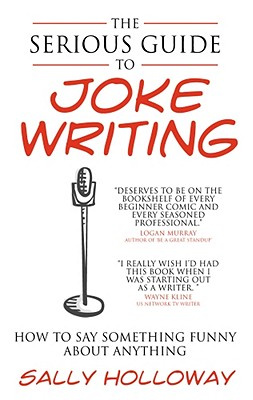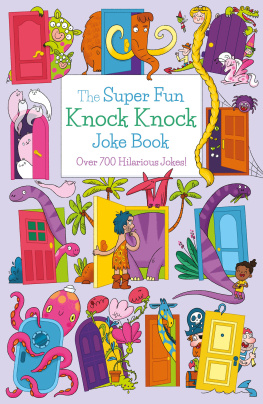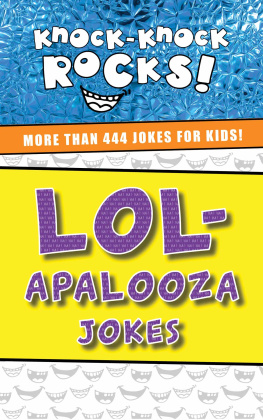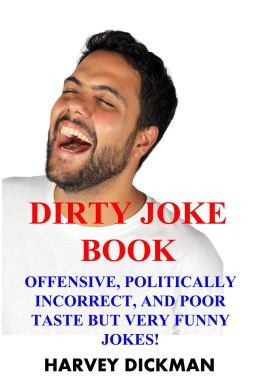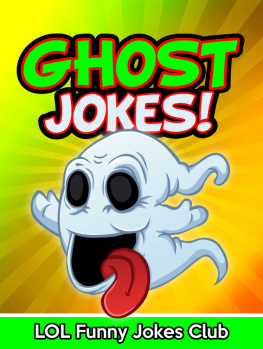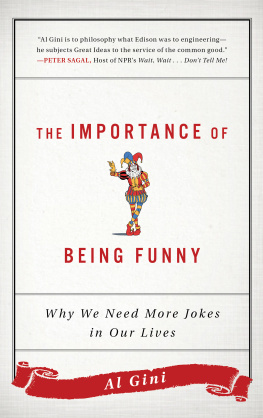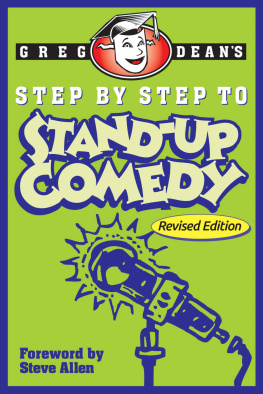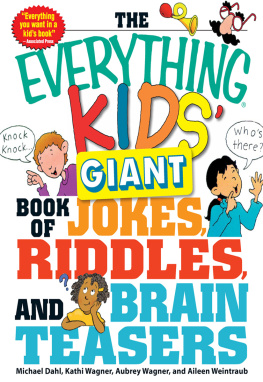THE SERIOUS GUIDE TO
JOKE WRITING
SALLY HOLLOWAY

First Published in Great Britain 2010
by www.BookShaker.com
Copyright Sally Holloway
This book is available in print at Amazon.com & Amazon.co.uk
All rights reserved. No part of this publication may be reproduced, stored in or introduced into a retrieval system, or transmitted, in any form, or by any means (electronic, mechanical, photocopying recording or otherwise) without the prior written permission of the publisher.
This book is sold subject to the condition that it shall not, by way of trade or otherwise, be lent, resold, hired out, or otherwise circulated without the publishers prior consent in any form of binding or cover other than that in which it is published and without a similar condition including this condition being imposed on the subsequent purchaser.
To Steve, for all the jokes weve
shared and all those yet to come.
Praise
This is the best book about joke writing that I have ever read (and Ive read a lot!). The exercises that she sets out in each chapter are incredibly easy to grasp and indicate a clear method without in any way handicapping the individual performers creativity. Sally has written a very concise and accessible book that deserves to be on the bookshelf of every beginner comic and every seasoned professional. I wish it had existed when I started out.
Logan Murray, author of Be a Great Standup
I really wish Id had this book when I was starting out as a writer. Then Id have had a time machine as well!
Wayne Kline, US network TV writer
Sally enables you to find what is funny about a subject and extract it to paper in your own unique way. The whole course has been very helpful in tooling me up for when I get stuck writing jokes.
This course has exceeded my expectations. I enjoyed the exercises, especially joke-webs. I like how they could take you quite a distance away from the original subject without trying too hard.
I loved the surrealist inquisition it really helped to generate ideas away from the obvious.
Since your course, I cant stop writing redefinitions!
I loved the surrealist Inquisition and stream of consciousness ways of writing because it loosens and frees associations and get the sub-conscious flowing creatively.
I just wanted to say how much I enjoyed the course, thank you very much Sally, it has done wonders for me.
Writing jokes from Newspapers has created a revolution in my brain thank you, I have never felt so creative.
Feedback from students on Sallys Joke Writing Classes
Acknowledgements
This book has been written over two years.
When I talk about the class I actually mean a number of classes I have taught over that time and Im very grateful to all of the participants.
Amused Moose Comedy Writing classes (2004, 2005, 2006) were my early guinea pigs along with the 2007 Jokes Jokes Jokes class held in Hastings.
Paul F. Taylor, Ayad Andrews, Kim Dolman, Maureen Younger Isabelle Tonge, Christine Lawrence, David the mystery man from Hastings , Paul Westwood, Kevin Conn, Sue Lenier, John Kelly, Bea Lacey, Steve Savage, Martin Ansell, Val Lee, Karl Edrik (RIP, hes out there somewhere enjoying the cosmic joke) and Steve Rose from my two 2008 Joke writing Classes. These good people sparked the whole idea of a joke writing book.
Jennifer Allen, Danny Banks, Karl Davison, Anton Hammond, Kara Jeffrey, Bruce Knight, Bea Lacey, Val Lee, Sue Lenier, Clive Osborne, Kaye Quinley and Steve Savage from the 2008 Stand-up Course. They created the Strikes Joke-web in Chapter 3.
Heather Alexandra, Martin Ansell, Simon Cooper, LouLou Cousin, Karl Davison, Jean Kelley, Anton Hammond, Anita Jardine, Val Lee, Sidonie Mitchel Wade, Clive Osbourne, Suzi Payton and Steve Savage from the 2009 Intermediate Stand-up Class. They did the Art-Relationships Double Joke-web in Chapter 5.
Thanks also to the 2008 Amused Moose, Edinburgh Comedy Writing Course as well as the people who attended my workshop at the 2008 British Association of Comedy Writers Conference which the Carol Vorderman exercise in Writing Jokes From Newspapers (Chapter 7) is based on.
Id like to give a particular mention to...
Elisa Roche from the Daily Express who kindly gave me permission to use her article Its sum task to find a new Carol in Writing Jokes From Newspapers (Chapter 7).
Paul Westwood, Sue Lenier and John Kelly (2008 Joke writing Class) who wrote nearly all the jokes in Redefinitions - How Did The Class Do (Chapter 1).
LouLou Cousin and Jean Kelley (2009 Intermediate Stand-up course)who gave me permission to use their homework and wrote the bulk of the jokes in Hadron Joke Collider - How Did The Class Do (Chapter 5).
Piers Campbell (Amused Moose Comedy Writing Course) who wrote the Mohican story in one of my early classes and I have used it as an example ever since. It appears in Chapter 1.
Bea Lacey (2008 Joke Writing Course) for showing me that the Surrealist Inquisition was a viable method of joke writing and for some people its where its at!
Ayad Andrews and Sue Lenier who wrote various jokes featured in several How Did the Class Do sections. Ayad also read the mostly terrible early drafts of this book and gave me encouragement anyway.
Angie McAvoy from whose writing method I developed the Stream-of-Consciousness exercises.
Andrew Jobbins who experimented on jokes with me in the late nineties and with whom I discovered that jokes exist in the ether.
Hils Jago for knowing I could teach joke writing before I knew it myself.
Simon Dowd who is the comic who used to write toppers for my sketches (Chapter 8), and whose Friday afternoon phone calls (Chapter 13) made me reassess what comedy was all about. He gave me endless support writing this book.
Rachel Spring and John Kelly who, along with Paul Westwood (already mentioned above), proof read this book at different stages.
The Illiterati. My local creative writing group who allowed me to read them sections of this book (sometimes over and over again).
Andrea Samuelson for endless support and power chats.
Sue Middleton for being so supportive always.
Dan Evans, whose comments on my manuscript were so insightful that this book is better for him having read it.
Joe Gregory for redrawing my cartoons so wonderfully.
Steve Amos and SATC for kick-starting my comedy courses in Hastings.
Finally, I am very grateful to Tim Vine, Jason John Whitehead and Tiernan Dooyab for letting me use their beautifully crafted jokes as examples in this book.
Introduction
The Difference Between Being Funny With Your Mates And Writing Jokes For A Living
Who here is funny with their mates? I always ask my new classes.
A few people always sheepishly put their hand up.
Dont be shy, I say. Because if youre funny with your mates you can transfer that skill to doing it for a living. You really can.
People start to look very pleased at this point.
BUT, I warn them, youre going to have to put some work in.
One of the biggest challenges I face as a joke writing tutor is that people want to write jokes without putting in any effort because thats how it feels when they are being funny with their mates.
I would argue that when youre with mates you are actually working quite hard without realising it. It seems easy because youre relaxed, youre confident, youre going over a well worn subject you know and love. The general chit chat of the group gives you numerous potential set-up lines to play off, and even though youre thinking really hard in order to do that, youre enjoying it so much that you dont even notice how furiously your brain is working and how totally focused you are.
Next page
